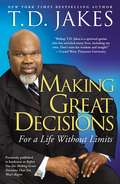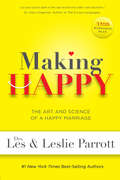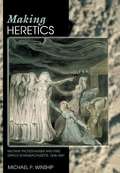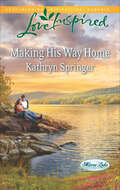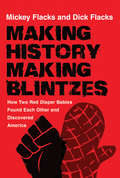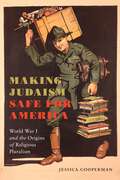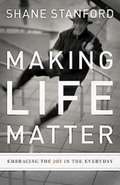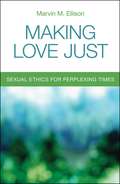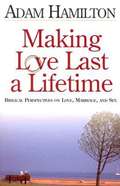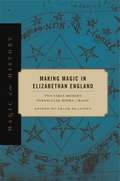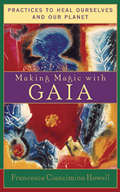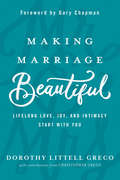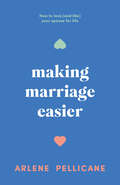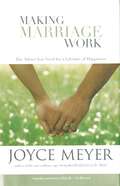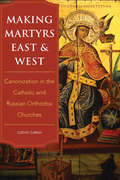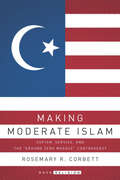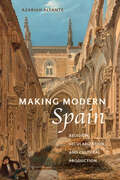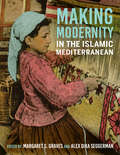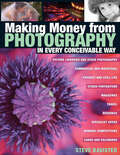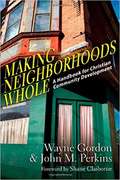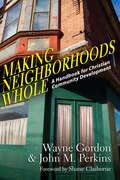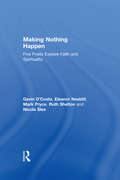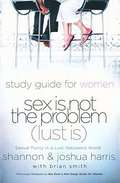- Table View
- List View
Making Great Decisions: For a Life Without Limits
by T.D. JakesNew York Times bestselling author T.D. Jakes explains the tools that we need to know—whether we&’re single and looking to have a committed relationship or already married—before taking the next big step.The star of BET&’s Mind, Body & Soul, and featured guest speaker on Oprah&’s Lifeclass, Potter&’s House pastor, T.D. Jakes turns his attention to the topic of relationships, guiding you on the right track to making decisions you will benefit from for the rest of your life. In the vein of Joel Osteen&’s Become a Better You and Dr. Phil&’s Life Strategies, the New York Times bestselling Making Great Decisions gives you the psychological and practical tools you need to reflect, discern, and decide the next step toward strong relationships in your life. &“Remember,&” writes T.D. Jakes, &“your tomorrow is no better than the decisions you make today.&” &“My promise is that if you read this book, you will be equipped, you will know all you need to know about making foolproof relational decisions,&” writes T.D. Jakes. Choosing the right partner, at home or at work, is one of the most consequential decisions we&’ll ever make. How can we be sure that we&’re choosing wisely? How do we know if we&’re doing the right thing when we change careers? By breaking our decisions down into their five crucial components: -Research: gathering information -Roadwork: removing obstacles -Rewards: listing choices and visualizing consequences -Revelation: narrowing your options and making your selection -Rearview: looking back and adjusting as necessary to stay on course Clear-sighted, realistic, and spiritually uplifting, Making Great Decisions is one of those rare books that can change lives.
Making Happy: The Art and Science of a Happy Marriage
by Les Parrott Leslie ParrottDiscover the six counter-intuitive dials to turn right now in your relationship. these are proven happiness boosters. and let’s face it, knowing how to make happiness—the deep and abiding joy of feeling good together—isn’t always easy for time-starved and sleep-deprived couples. Making Happy will change all that by: Instantly making your relationship 25 percent happier. Countering the effects of taking each other for granted so you can notice even more things you appreciate about each other. Knowing the easy way to ensure your partner is happier today than yesterday. Relationship experts Drs. Les and Leslie Parrott bring all the relevant research together in Making Happy and show you how to elevate happiness in your relationship. It’s easier than you think. Includes an immensely practical three-week Happiness Plan.
Making Heretics: Militant Protestantism and Free Grace in Massachusetts, 1636-1641
by Michael P. WinshipMaking Heretics is a major new narrative of the famous Massachusetts disputes of the late 1630s misleadingly labeled the "antinomian controversy" by later historians. Drawing on an unprecedented range of sources, Michael Winship fundamentally recasts these interlocked religious and political struggles as a complex ongoing interaction of personalities and personal agendas and as a succession of short-term events with cumulative results. Previously neglected figures like Sir Henry Vane and John Wheelwright assume leading roles in the processes that nearly ended Massachusetts, while more familiar "hot Protestants" like John Cotton and Anne Hutchinson are relocated in larger frameworks. The book features a striking portrayal of the minister Thomas Shepard as an angry heresy-hunting militant, helping to set the volatile terms on which the disputes were conducted and keeping the flames of contention stoked even as he ostensibly attempted to quell them. The first book-length treatment in forty years, Making Heretics locates its story in rich contexts, ranging from ministerial quarrels and negotiations over fine but bitterly contested theological points to the shadowy worlds of orthodox and unorthodox lay piety, and from the transatlantic struggles over the Massachusetts Bay Company's charter to the fraught apocalyptic geopolitics of the Reformation itself. An object study in the ways that puritanism generated, managed, and failed to manage diversity, Making Heretics carries its account on into England in the 1640s and 1650s and helps explain the differing fortunes of puritanism in the Old and New Worlds.
Making His Way Home (Mirror Lake #6)
by Kathryn SpringerA Wisconsin pilot must face the life—and love—he left behind in his home town in this inspirational romance.You Can Go Home AgainThe only thing Cole Merrick wants to do with the Mirror Lake property he inherited is sell it. And the sooner the better. The handsome pilot has no attachment to the place where he and Grace Eversea fell in love years ago. He never meant to break his promises—or her heart—when he left town without a word. Now, just in time for Mirror Lake’s 125th birthday celebration, he comes face-to-face with all he left behind, including Grace. And he wonders if he ought to give this town a second chance. If only he can convince Grace to do the same for him. . . .
Making History / Making Blintzes: How Two Red Diaper Babies Found Each Other and Discovered America
by Mickey Flacks Dick FlacksMaking History/Making Blintzes is a chronicle of the political and personal lives of progressive activists Richard (Dick) and Miriam (Mickey) Flacks, two of the founders of Students for a Democratic Society (SDS). As active members of the Civil Rights movement and the anti-Vietnam War movement in the 1960s, and leaders in today’s social movements, their stories are a first-hand account of progressive American activism from the 1960s to the present. Throughout this memoir, the couple demonstrates that their lifelong commitment to making history through social activism cannot be understood without returning to the deeply personal context of their family history—of growing up “Red Diaper babies” in 1950s New York City, using folk music as self-expression as adolescents in the 1960s, and of making blintzes for their own family through the 1970s and 1980s. As the children of immigrants and first generation Jews, Dick and Mickey crafted their own religious identity as secular Jews, created a critical space for American progressive activism through SDS, and ultimately, found themselves raising an “American” family.
Making Judaism Safe for America: World War I and the Origins of Religious Pluralism (Religion and Social Transformation #4)
by Jessica CoopermanHonorable Mention, 2019 Saul Viener Book Prize, given by the American Jewish Historical SocietyA compelling story of how Judaism became integrated into mainstream American religion In 1956, the sociologist Will Herberg described the United States as a “triple-melting pot,” a country in which “three religious communities - Protestant, Catholic, Jewish – are America.” This description of an American society in which Judaism and Catholicism stood as equal partners to Protestantism begs explanation, as Protestantism had long been the dominant religious force in the U.S. How did Americans come to embrace Protestantism, Catholicism, and Judaism as “the three facets of American religion?”Historians have often turned to the experiences of World War II in order to explain this transformation. However, World War I’s impact on changing conceptions of American religion is too often overlooked. This book argues that World War I programs designed to protect the moral welfare of American servicemen brought new ideas about religious pluralism into structures of the military. Jessica Cooperman shines a light on how Jewish organizations were able to convince both military and civilian leaders that Jewish organizations, alongside Christian ones, played a necessary role in the moral and spiritual welfare of America’s fighting forces. This alone was significant, because acceptance within the military was useful in modeling acceptance in the larger society. The leaders of the newly formed Jewish Welfare Board, which became the military’s exclusive Jewish partner in the effort to maintain moral welfare among soldiers, used the opportunities created by war to negotiate a new place for Judaism in American society. Using the previously unexplored archival collections of the JWB, as well as soldiers’ letters, memoirs and War Department correspondence, Jessica Cooperman shows that the Board was able to exert strong control over expressions of Judaism within the military. By introducing young soldiers to what it saw as appropriately Americanized forms of Judaism and Jewish identity, the JWB hoped to prepare a generation of American Jewish men to assume positions of Jewish leadership while fitting comfortably into American society.This volume shows how, at this crucial turning point in world history, the JWB managed to use the policies and power of the U.S. government to advance its own agenda: to shape the future of American Judaism and to assert its place as a truly American religion.
Making Life Matter: Embracing the Joy in the Everyday
by Shane StanfordIn a world of fast-paced schedules and priorities, conversations about what makes for a life well lived are a rarity and a luxury. But what if the daily pace of life held in itself the way to make choices more significant? What if the daily to-do lists gave a glimpse into how people might change their future? What if the daily grind, as arduous as it might seem, held the key to a life full of meaning and potential? What if everyday, simple steps, instead of some complex list of seemingly unattainable principles, showed how to make life matter?Making Life Matter answers these questions and shows that the steps for making life matter are found in rather ordinary decisions, attitudes, and patterns found in normal routines. This book is about our story and our journey, and what we do and feel along the way.
Making Love Just: Sexual Ethics For Perplexing Times
by Marvin M. EllisonEthical reflection about sexuality is increasingly controversial, complex, and conflicted. After centuries of conflicting messages from the tradition, Christians are understandably confused about how exactly the good news pertains to sexuality. Using a series of provocative questions, Marvin Ellison, a pioneer in contemporary Christian rethinking of sexuality and sexual ethics, attempts to increase readers' skills and confidence for engaging in ethical deliberation about sexuality. Redrawing the conventional, rule-based sexual morality, often rigidly and legalistically applied or broadly ignored, entails transcending fear and shame to redraw the sexual map, he argues. Ellison works to affirm a more relationally focused ethical framework, from which to deliberate about premarital and extramarital sex, marriage and divorce, homosexuality, contraception, abortion, spousal abuse, and sex-education. Students and all adults will welcome this book for enabling their personal clarity, approach to relationships, and mindful participation in respectful moral debate.
Making Love Last a Lifetime: Biblical Perspectives on Love, Marriage, and Sex
by Adam HamiltonIn this thoughtful, inspiring book, Adam Hamilton offers some keys to helping you develop a healthy, satisfying, and successful marriage. He draws on insights from surveys of over two thousand single and married persons, from experiences shared by couples he interviewed, from reflections based on fifteen years of counseling individuals and couples, and from his own experiences in marriage. Most importantly, he draws on insights from the Bible to help you make love last a lifetime. If you are single, this book can prepare you to have a successful relationship. If you are married, the book can help you grow in your relationship with your spouse so that you can experience all that God intends a marriage to be.
Making Magic in Elizabethan England: Two Early Modern Vernacular Books of Magic (Magic in History)
by Frank KlaassenThis volume presents editions of two fascinating anonymous and untitled manuscripts of magic produced in Elizabethan England: the Antiphoner Notebook and the Boxgrove Manual. Frank Klaassen uses these texts, which he argues are representative of the overwhelming majority of magical practitioners, to explain how magic changed during this period and why these developments were crucial to the formation of modern magic.The Boxgrove Manual is a work of learned ritual magic that synthesizes material from Henry Cornelius Agrippa, the Fourth Book of Occult Philosophy, Heptameron, and various medieval conjuring works. The Antiphoner Notebook concerns the common magic of treasure hunting, healing, and protection, blending medieval conjuring and charm literature with materials drawn from Reginald Scot’s famous anti-magic work, Discoverie of Witchcraft. Klaassen painstakingly traces how the scribes who created these two manuscripts adapted and transformed their original sources. In so doing, he demonstrates the varied and subtle ways in which the Renaissance, the Reformation, new currents in science, the birth of printing, and vernacularization changed the practice of magic.Illuminating the processes by which two sixteenth-century English scribes went about making a book of magic, this volume provides insight into the wider intellectual culture surrounding the practice of magic in the early modern period.
Making Magic in Elizabethan England: Two Early Modern Vernacular Books of Magic (Magic in History)
by Frank KlaassenThis volume presents editions of two fascinating anonymous and untitled manuscripts of magic produced in Elizabethan England: the Antiphoner Notebook and the Boxgrove Manual. Frank Klaassen uses these texts, which he argues are representative of the overwhelming majority of magical practitioners, to explain how magic changed during this period and why these developments were crucial to the formation of modern magic.The Boxgrove Manual is a work of learned ritual magic that synthesizes material from Henry Cornelius Agrippa, the Fourth Book of Occult Philosophy, Heptameron, and various medieval conjuring works. The Antiphoner Notebook concerns the common magic of treasure hunting, healing, and protection, blending medieval conjuring and charm literature with materials drawn from Reginald Scot’s famous anti-magic work, Discoverie of Witchcraft. Klaassen painstakingly traces how the scribes who created these two manuscripts adapted and transformed their original sources. In so doing, he demonstrates the varied and subtle ways in which the Renaissance, the Reformation, new currents in science, the birth of printing, and vernacularization changed the practice of magic.Illuminating the processes by which two sixteenth-century English scribes went about making a book of magic, this volume provides insight into the wider intellectual culture surrounding the practice of magic in the early modern period.
Making Magic with Gaia: Practices to Heal Ourselves and Our Planet
by Francesca Ciancimino HowellThe author of Food, Festival and Religion shows how spiritual practices drawn from the ancient magical arts can help to heal Mother Earth. A Greenpeace activist, Wiccan High Priestess, and proud Soccer Mom, Francesca Howell has been involved in magical traditions and wildlife preservation since childhood. In this one-of-a-kind book, she shares her everyday suggestions for spiritual renewal through connecting with nature. The meditations, ceremonies, and spellcraft in Making Magic with Gaia spring from an ancient Pagan tradition of Earth stewardship, which blends deep ecology, magic, and activism to bring the reader into a closer communion and harmony with Mother Earth. Packed with practical suggestions (recycling, gardening without pesticides, and conserving water) and mystical rituals (shamanism, crystal magic, and Power Animals) for helping the planet, this book is written for anyone with a spiritual ecological awareness. Not the witchcraft of Gothic novels, Making Magic with Gaia is based on a modern religion with ancient roots that can heal the Earth as it heals the practitioner.
Making Marriage Beautiful: Lifelong Love, Joy, and Intimacy Start with You
by Gary Chapman Christopher Greco Dorothy Littell GrecoWhat makes a marriage beautiful? Honesty? Compatibility? Physical and emotional intimacy? All of these are important, but there’s one component that determines the quality and longevity of a marriage more than anything else: a willingness to grow. Because a wedding joins together two imperfect people, all couples experience disappointment, conflict, and pain. How husbands and wives respond to these challenges determines the kind of people they will become and the kind of marriage they will have.Making Marriage Beautiful reveals how the pursuit of Christ results in profound transformation for both the individual and the marriage. Rather than offering clichés and formulas, Greco relies on candor, humor, and real life stories to bring encouragement and wisdom to all couples, regardless of whether they have been married four weeks or forty years.
Making Marriage Easier: How to Love (and Like) Your Spouse for Life
by Arlene PellicaneA joyous summons to love (and like) your spouse for a lifetime.Many people today are pessimistic about marriage. It&’s hard. It will end in divorce. If you marry, you exchange romance for responsibility. Yet research tells us the happiest people on the planet are those in healthy marriages.Can marriage be great—not just for the rare few—but for you? After twenty-five years of marriage, Arlene Pellicane has stories and biblical wisdom to share. Full of real life that will make you laugh, Making Marriage Easier addresses common threats to our marriage—poor communication, tension over differences, lack of physical intimacy, parenting stress, and more.Four key decisions will help you clarify your values and create a clear path forward. Each short chapter ends with life lessons, questions to ponder with your spouse or in a group, and prayers to strengthen and encourage. Marriage is part of God&’s awesome, wonderful plan. It&’s meant to be a celebration, not a life sentence. Whether you&’re holding a baby for the first time or figuring out retirement, this book is fresh kindling for a bettermarriage that can go the distance.
Making Marriage Work
by Joyce MeyerPreviously published as Help Me, I'm Married, MAKING MARRIAGE WORK offers Joyce's insights on how to make a marriage succeed, thrive, and bless the lives of entire families.Joyce shares with married couples how God can transform a marriage. Whether newly wed, happily married, in a marriage crisis, or just in a relationship rut, Joyce's principles will help energize and revitalize a relationship.Discover how to:Take the focus off yourself and your spouse and look to the LordUnleash powerful truths from God's Word for you and your marriageUnderstand the opposite sexOvercome roadblocks to a triumphant marriageLive successfully with an insecure personCreate peace and order in your heart and in your home.Joyce's practical, how-to advice will guide couples along the path to releasing God's power on their lives, and in their marriage.
Making Martyrs East and West: Canonization in the Catholic and Russian Orthodox Churches
by Cathy CaridiFor centuries, Catholics in the Western world and the Orthodox in Russia have venerated certain saints as martyrs. In many cases, both churches recognize as martyrs the same individuals who gave their lives for Jesus Christ. On the surface, it appears that while the external liturgical practices of Catholics and Russian Orthodox may vary, the fundamental theological understanding of what it means to be a martyr, and what it means to canonize a saint, are essentially the same. But are they? In Making Martyrs East and West, Caridi examines how the practice of canonization developed in the West and in Russia, focusing on procedural elements that became established requirements for someone to be recognized as a saint and a martyr. She investigates whether the components of the canonization process now regarded as necessary by the Catholic Church are fundamentally equivalent to those of the Russian Orthodox Church, and vice versa, while exploring the possibility that the churches use the same terminology and processes, but in fundamentally different ways that preclude the acceptance of one church's saints by the other. Caridi examines official church documents and numerous canonization records, collecting and analyzing information from several previously untapped medieval Russian sources. Her highly readable study is the first to focus on the historical documentation on canonization specifically for juridical significance. It will appeal to scholars of religion and church history, as well as ecumenicists, liturgists, canonists, and those interested in East-West ecumenical efforts.
Making Moderate Islam: Sufism, Service, and the "Ground Zero Mosque" Controversy
by Rosemary CorbettDrawing on a decade of research into the community that proposed the so-called "Ground Zero Mosque," this book refutes the idea that current demands for Muslim moderation have primarily arisen in response to the events of 9/11, or to the violence often depicted in the media as unique to Muslims. Instead, it looks at a century of pressures on religious minorities to conform to dominant American frameworks for race, gender, and political economy. These include the encouraging of community groups to provide social services to the dispossessed in compensation for the government's lack of welfare provisions in an aggressively capitalist environment. Calls for Muslim moderation in particular are also colored by racist and orientalist stereotypes about the inherent pacifism of Sufis with respect to other groups. The first investigation of the assumptions behind moderate Islam in our country, Making Moderate Islam is also the first to look closely at the history, lives, and ambitions of the those involved in Manhattan's contested project for an Islamic community center.
Making Modern Spain: Religion, Secularization, and Cultural Production (Campos Ibéricos: Bucknell Studies in Iberian Literatures and Cultures)
by Azariah AlfanteIn this elegantly written study, Alfante explores the work of select nineteenth-century writers, intellectuals, journalists, politicians, and clergy who responded to cultural and spiritual shifts caused by the movement toward secularization in Spain. Focusing on the social experience, this book probes the tensions between traditionalism and liberalism that influenced public opinion of the clergy, sacred buildings, and religious orders. The writings of Cecilia Böhl de Faber (Fernán Caballero), Gustavo Adolfo Bécquer, Benito Pérez Galdós, and José María de Pereda addressed conflicts between modernizing forces and the Catholic Church about the place of religion and its signifiers in Spanish society. Foregrounding expropriation (government confiscation of civil and ecclesiastical property) and exclaustration (the expulsion of religious communities), and drawing on archival research, the history of disentailment, cultural theory, memory studies, and sociology, Alfante demonstrates how Spain’s liberalizing movement profoundly influenced class mobility and faith among the populace.
Making Modernity in the Islamic Mediterranean
by Marcus Milwright Peter Christensen Ünver Rüstem Gülru Çakmak Hala Auji Emily Neumeier Jessica Gerschultz Ashley Dimmig David J. RoxburghThe Islamic world's artistic traditions experienced profound transformation in the 19th century as rapidly developing technologies and globalizing markets ushered in drastic changes in technique, style, and content. Despite the importance and ingenuity of these developments, the 19th century remains a gap in the history of Islamic art. To fill this opening in art historical scholarship, Making Modernity in the Islamic Mediterranean charts transformations in image-making, architecture, and craft production in the Islamic world from Fez to Istanbul. Contributors focus on the shifting methods of production, reproduction, circulation, and exchange artists faced as they worked in fields such as photography, weaving, design, metalwork, ceramics, and even transportation. Covering a range of media and a wide geographical spread, Making Modernity in the Islamic Mediterranean reveals how 19th-century artists in the Middle East and North Africa reckoned with new tools, materials, and tastes from local perspectives.
Making Money from Photography in Every Conceivable Way
by Steve BavisterIn this comprehensive manual, Steve Bavister gives an invaluable insight into the business of being a photographer, with tips and examples of how to take great pictures in every genre, including:Advice on shooting and selling stock photographyHow to get your work into picture librariesSuccessful strategies for wedding and portrait photographyInspirational, high-quality examples from top photographersTips on running your own photography business--This text refers to an out of print or unavailable edition of this title.
Making Neighborhoods Whole: A Handbook For Christian Community Development
by Shane Claiborne John M. Perkins Wayne GordonAlready with decades of experience speaking prophetically into the charged racial climate of the American south, John Perkins began to see a need for organized thinking and collaborative imagination about how the church engages urban ministry. And so the Christian Community Development Association (CCDA) was born, with Wayne Gordon an immediate and enthusiastic participant. Nearly thirty years later CCDA?s eight key components of community development still set the bar for how churches, parachurches and nonprofits engage cities with the whole gospel. Relocation Reconciliation Redistribution Leadership Development Listening to the Community Church-Based Development A Wholistic Approach to Ministry Empowerment In Making Neighborhoods Whole Perkins and Gordon revisit these eight commitments and how they've played out in real communities, even as they scan the horizon of urban ministry to set a new tone. With profiles of longstanding and emerging community development ministries, they guide a new conversation and empower disciples of Jesus to seek the welfare of their cities to the glory of God.
Making Neighborhoods Whole: A Handbook for Christian Community Development
by John M. Perkins Wayne GordonAlready with decades of experience speaking prophetically into the charged racial climate of the American south, John Perkins began to see a need for organized thinking and collaborative imagination about how the church engages urban ministry. And so the Christian Community Development Association (CCDA) was born, with Wayne Gordon an immediate and enthusiastic participant. Nearly thirty years later CCDA?s eight key components of community development still set the bar for how churches, parachurches and nonprofits engage cities with the whole gospel.RelocationReconciliationRedistributionLeadership DevelopmentListening to the CommunityChurch-Based DevelopmentA Wholistic Approach to MinistryEmpowermentMaking Neighborhoods Whole
Making Nothing Happen: Five Poets Explore Faith and Spirituality
by Eleanor Nesbitt Gavin D'Costa Mark Pryce Ruth SheltonMaking Nothing Happen is a conversation between five poet-theologians who are broadly within the Christian tradition - Nicola Slee, Ruth Shelton, Mark Pryce, Eleanor Nesbitt and Gavin D'Costa. Together they form The Diviners - a group which has been meeting together for a number of years for poetry, and theological and literary reflection. Each poet offers an illuminating reflection on how they understand the relation between poetry and faith, rooting their reflections in their own writing, and illustrating discussion with a selection of their own poems. The poets open up issues for deeper exploration and reflection, including: the nature of creativity and the distinction between divine and human creation; the creative process as exploration, epiphany and revelation; the forging of identity through writing; ways in which the arts reflect, challenge and dialogue with faith, and faith can inform and challenge the arts; power and voice in poetry and faith; and ways in which race, gender and culture interact with and shape poetic and theological discourse. This book will be of interest to poets and theologians, to all who read poetry and are interested in the connections between literature and faith, to those seeking inspiration for preaching, liturgy and pastoral care, and to those committed to the practice and nurturing of a contemplative attitude to life in which profound attention and respect are offered to words and to the creative Word at work.
Making Ordinary Days Extraordinary
by Gloria Gaither Shirley DobsonModern families face increasing demands, from seemingly endless activities for kids to heavy requirements for working parents. More than ever, families need resources to strengthen their bonds with each other by creating and celebrating special memories. Complete with heartwarming vignettes from well-known Christian personalities, this charming book includes a wealth of creative memory-building activities. It's packed with potential for year-round fun! Make these moments last! It’s the simple moments that knit you together as a family-shared experiences that keep you close over the years. But these special times won’t just happen on their own, with today’s kids and parents all going in separate directions. Making Ordinary Days Extraordinaryis packed with creative activities that will help your own family make meaningful, long-lasting memories. You’ll find irresistible ideas such as film festivals, goofy golf, neighborhood circuses, instant parties, stealth love notes, ugly bug pageants, family websites, and pinata planets-along with fun twists on familiar pastimes. All you have to supply is a little of your time. . . and lots of love! Story Behind the Book Over 20 years ago,Let’s Make a Memorywas published in paperback and has become a classic now with over _ million copies sold. Now, Multnomah Publishers will repack and update this bestseller along with material fromHide it in Your Heartto create theLet’s Make a Memoryseries. Making Ordinary Days Extraordinarywill be the first book in this series with three additional titles to follow over the next two years. Gloria Gaither and Shirley Dobson share creative ways to spend time with families. This beautiful four-color book will give moms creative ideas and activities to share with their young ones especially during those summer months between school!
Making Peace With Your Past
by H. Norman WrightAre you struggling from feelings of loneliness, depression, anger, or fear? If so, there may be a link to events or ideas you formed in the past. Through Biblical examples, practical exercises, and ideas, you can find a way to make peace with past hurts and rejection. You can heal and be a happy, peaceful person.
